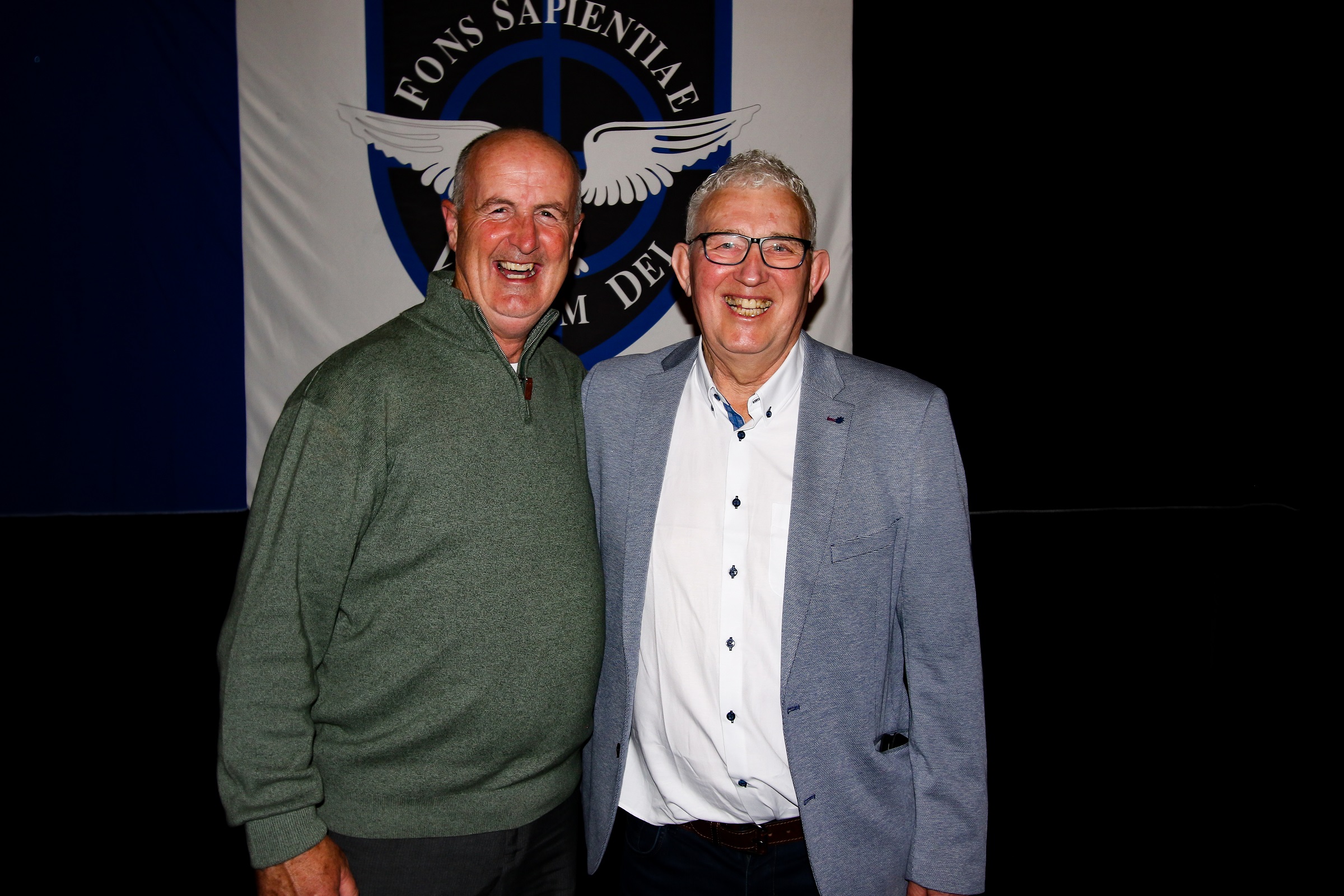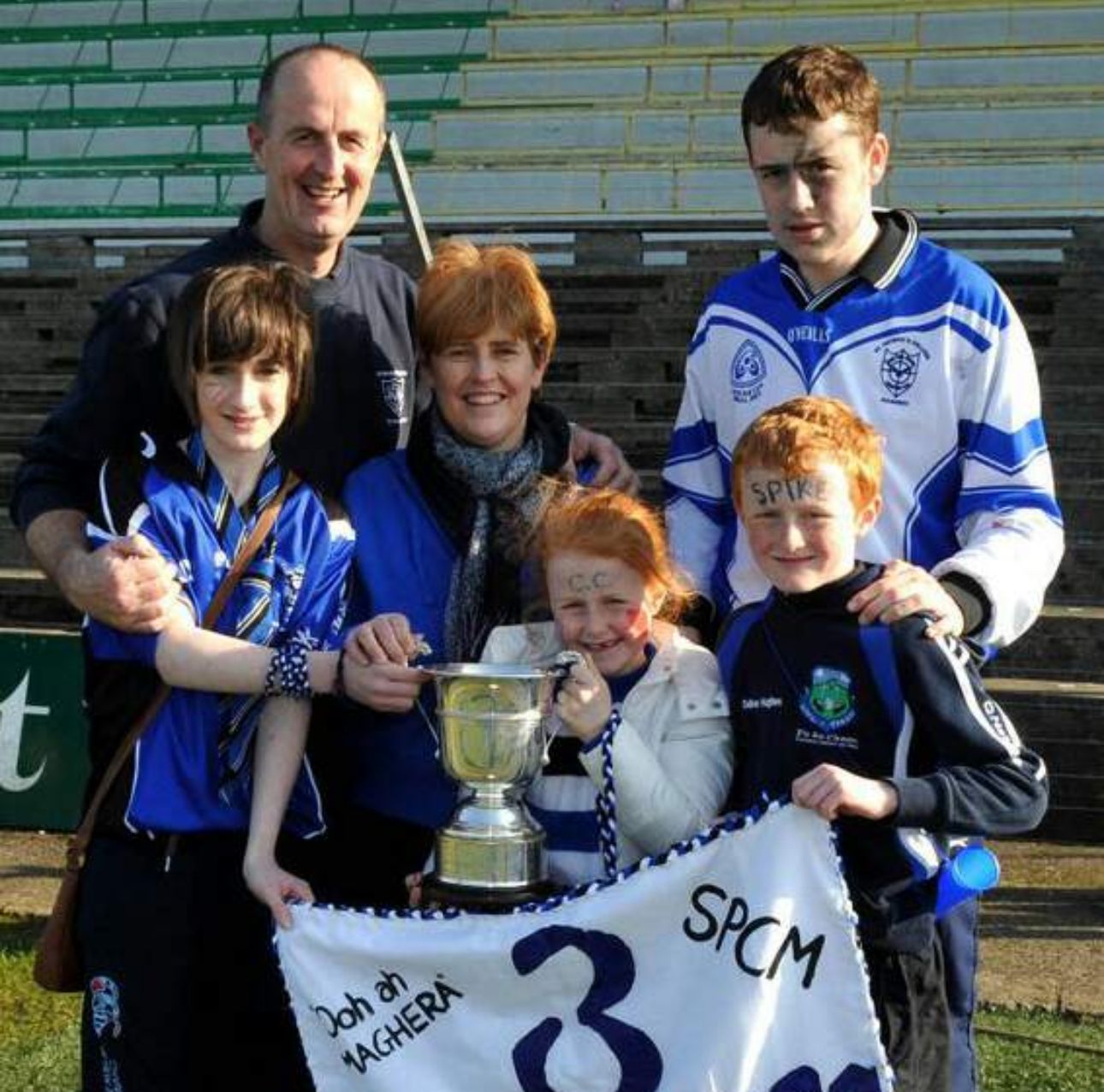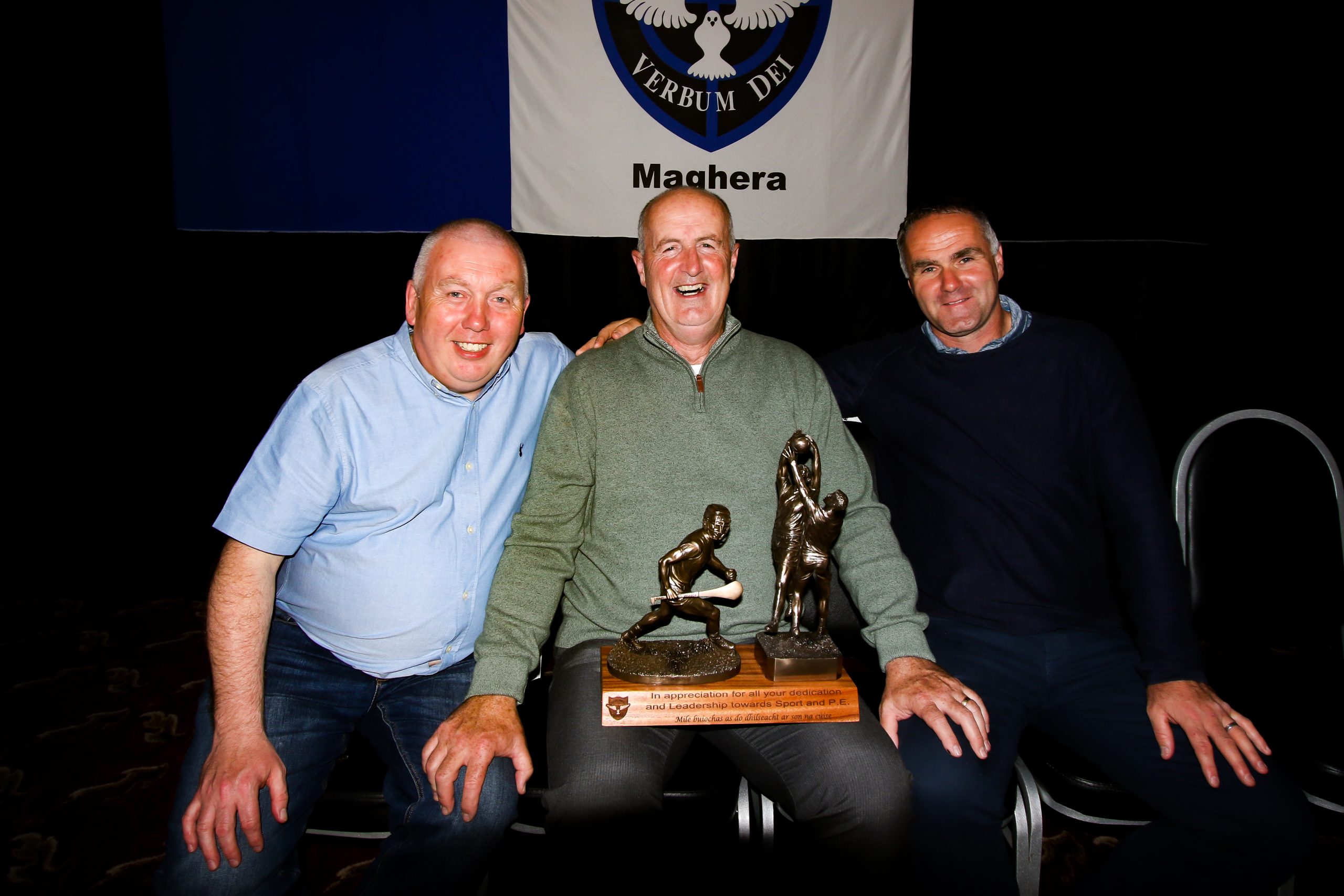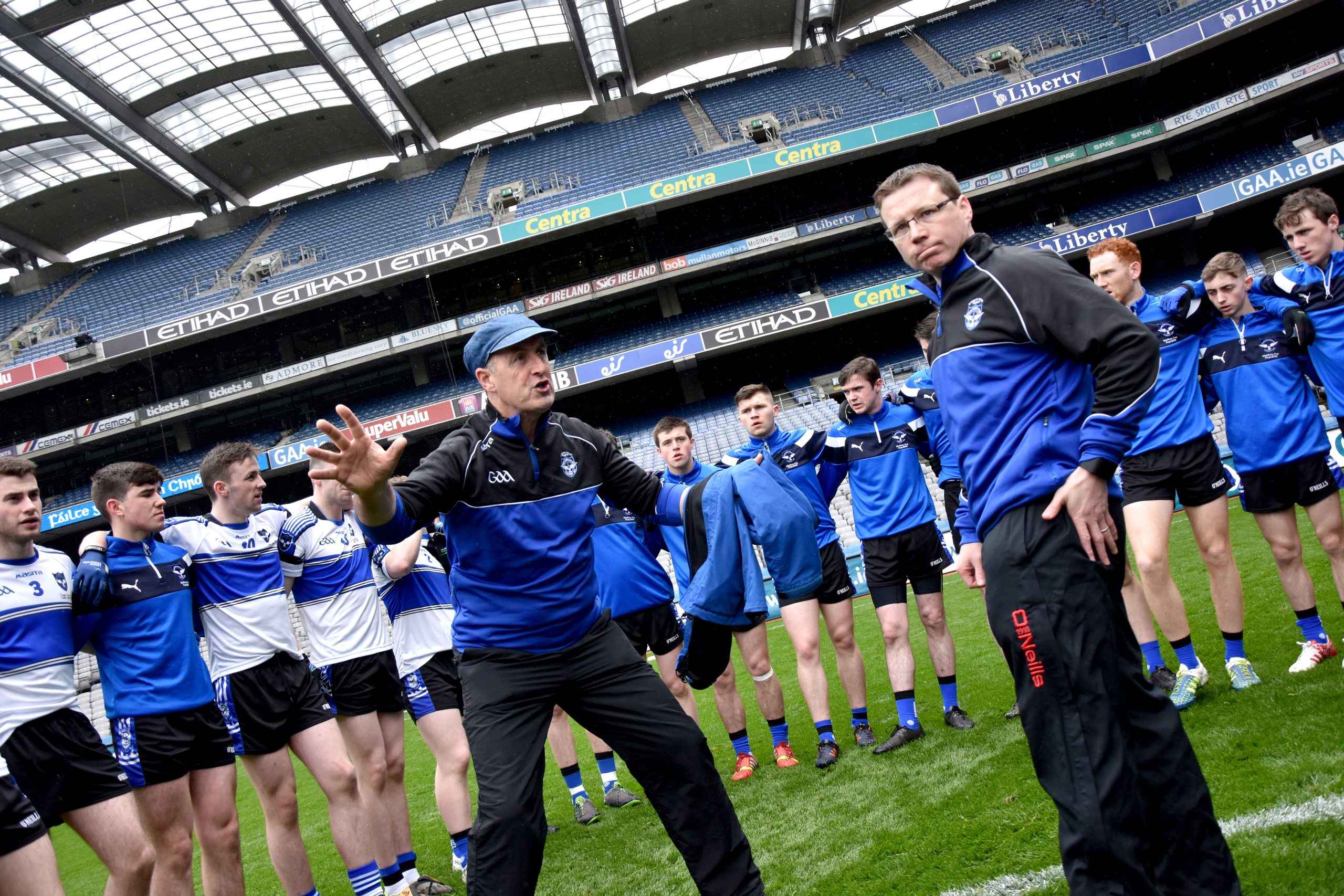Paul Hughes will sign off on 39 years at St Patrick’s College, Maghera later this month. Adrian McGuckin and Sean Marty Lockhart share their memories and pay tribute to him. Michael McMullan went to meet them
CALL it a hunch. Call it a gut feeling. Call it judgment of character. Call it what you want. Adrian McGuckin just knew he had his man.
September 1985 was coming into view. With Oliver Short taking a different fork in the road, St Patrick’s High School, Maghera had a PE vacancy to fill.
It’s interview day. McGuckin had been in the school 13 years. As Head of PE, he is seated alongside the principal, the late Fr Devine. The candidates come and go until decision time taps them on the shoulder.
“Paul would be the least known of them,” McGuckin said, pointing to a world where county players are often the PE candidate of choice.
Nearly 40 years later, sipping over a cuppa in Walsh’s Hotel, a decent kick of a ball from the school grounds, McGuckin can remember it like it was yesterday.
“I remember Fr Devine, turning and asking me what I thought, saying how it was me who was going to have to work with whoever was appointed,” McGuckin recalls.
Hughes was the man. Even though he lived in Derrytresk, just over 11 miles south along the shores of Lough Neagh from McGuckin in Ballinderry, they’d never met.
“He struck a chord with me,” McGuckin said of the interview. “His genuineness and humbleness came across, I just got a gut feeling.
“Paul got the job. Wasn’t it some appointment? One of my big things in my career in St Patrick’s was appointing Paul Hughes.”
The MacRory Cup was on its fourth visit to Maghera as McGuckin continued to lay the blocks of a dynasty. It was the flagship competition.
Hughes didn’t need to be asked twice to get involved with any football team, putting in the hard yards after school. It began with the Rannafast Cup.
Looking back over nearly four decades, his shoulder was rested against whatever wheel needed a shove. It was all about Maghera.

BEST FRIENDS…Paul Hughes and Adrian McGuckin, two legends of St Patrick’s Maghera. Photo: Brendan McTaggart
“How do you put it?” McGuckin asks. “He was totally involved in everything. He got on with things. You never had to tell Paul to do anything he always saw work. He got the work done before you knew that it was ready to be done.”
Lunchtimes were given up to help run class leagues, lend an ear for additional tuition or run an extra coaching session.
He’d never wanted thanks or praise. It was all about the children. On top of that, McGuckin speaks of how articulate and humble Hughes was.
“Humility is his middle name,” McGuckin said. “He had a way with children. I’ve never heard a pupil or a past pupil ever say a bad word about Paul Hughes.”
A towering figure and deep voice brought discipline without fear. There was space for both craic and quality teaching in the classroom.
“There was a good atmosphere in the class but the pupils all knew the bounds. Nobody went over the limits,” McGuckin said.
There was another admirer. Gráinne Patterson had been teaching in the school for a year. She had eyes for Paul from the day she laid eyes on him.
As the story goes, Gráinne asked Paul for a lift to the wake of a colleague’s mother. One thing led to another. Love. Engagement. Marriage.
Gráinne also retires this year. Their four children are also part of the school fabric. Diarmuid and Cliodhna are past pupils. Aoibhinn worked in the school and Odhran is a current teacher.
“When you’re talking about Paul, you’re talking about Paul and Gráinne,” McGuckin explains. “The two of them really came as a package. What the school owes them, it’s probably immeasurable.”
The slogan ‘every child matters’ is often rolled out. They are only words. Paul and Gráinne lived it every day of their school lives.
“Every child did really matter to them,” McGuckin said of their legacy.
He remembers a conversation with a past pupil recently when the top of Paul Hughes came up and his pending retirement. McGuckin suggested they were big shoes to fill. The response – they just won’t be filled.
***
Sean Marty Lockhart knows both sides of Paul Hughes. Having been taught and coached by him, Lockhart returned to Maghera as teacher.
A winner of titles under both McGuckin and Hughes, in the blue, black and white of St Patrick’s, Lockhart can see the trend. He too gathers his thoughts on the legacy Hughes will leave when he exits the school gates later this month.
“We hire teachers now, good teachers in the classroom but, for Maghera, you built the fabric in the school,” Lockhart said, nodding at McGuckin across the table.
Lockhart makes the point how Hughes carried it on. There was the extra value outside direct teaching time. It’s what he offered to give the pupils anything to help them on the ladder of life.
Lockhart, ever the deep thinker, outlines two types of people in life. There are energisers and those who cast negative vibes.
“I find in our school, there’s an unbelievable positivity,” he points out. And it has been passed on. Hughes carried that torch that others must pick up.
It would spill over at the end of class if there was any piece of advice sought to be given. The bell didn’t matter. The child did.
“He sat on with you and would’ve asked what you needed,” Lockhart said, using the example of how Tony Pulis paid tribute to the late Gary Speed.
In the eyes of Pulis, most soccer stars were takers but Speed was a giver. Hughes had that same train of thought when it came to teams in St Patrick’s, Maghera. Did anyone need a hand?
As the years pass, staff would then answer Paul’s call to give themselves to school life.

FAMILY TIME…Paul Hughes pictured with his family after school hurling success in the O’Keefe Cup
“There’s people in our school who take teams because of their loyalty to Paul, that’s phenomenal loyalty,” Lockhart explains.
And it comes with connecting with people. It was the same with the children. All the fancy drills are meaningless if you don’t connect with the child.
“If you don’t have relationships, it doesn’t matter what else you have,” McGuckin adds in agreement.
“You summed him up there, he’s a giver,” McGuckin continues, “and Gráinne is a giver as well. Totally selfless, the both of them, totally selfless.
“They give, give, give, give all the time. I just hope they’ll go straight through that gate on the last day of June and they’ll see for themselves, ‘it’s now our time.’”
McGuckin’s words have added meaning. His late wife Vera was a highly popular teacher in St Patrick’s. Their sons Ronan and Adrian were on winning school teams he managed.
Standing in a Cookstown car park, McGuckin senior’s phone lights up. It’s Hughes breaking the news.
“He says, me and her (Gráinne) are leaving. I felt it was the last part of me leaving,” McGuckin said. “I had a big connection with him, a really big connection with him.”
Passing on the news to his son Adrian, he also recalled the coaching of Hughes in St Patrick’s, how he’d take him aside to point out areas to improve on.
“I see girls and boys making mistakes,” McGuckin senior said of some of the modern coaching he sees. It’s all collective and blemishes are left unpolished.
Correct coaching, in its most basic form, informs players of the correct positioning of their heads, hands and feet.
“It’s just bang, bang, bang,” McGuckin said. “They see mistakes but then the hour is over and that’s it. He (Adrian junior) said Paul was taking him aside and showing him.”
***
It’s 29 years since Lockhart’s last action as a St Patrick’s, Maghera player, hoisting the MacRory Cup aloft.
One of six players overage for the 1995 Hogan success, it was his last dance and seven years after being part of the winning first year team.
“Paul was my form tutor in first year and I remember this big massive man, this giant,” Lockhart said of his first memories.
When St Patrick’s reached the D’Alton Cup final in second year, against local rivals St Pius X, Magherafelt, Hughes and Colm O’Kane looked after the team.
“I had my appendix out about two weeks before the final,” Lockhart recalls.
He begged Hughes to let him play but player welfare came before any value of a final and local rivalry. Lockhart’s parents and doctor were the only verdicts that counted. When medical advice outlined a four- to six-week window, Hughes ruled out any chance of inclusion.
“I was devastated,” Lockhart recalls vividly. “I sat on that bench in Lavey and I watched boys like Johnny McBride and Kevin Heaney hammer us by 16 points that day.”
Three years later, Hughes was Lockhart’s manager for a Rannafast campaign. The final against St Pius was evenly poised at half time.
In the corner of a dressing room in Coalisland, Hughes thumped a small table before making his plea. The cup needed to be there half an hour later. Studs clinked down the tunnel. A determined Maghera side obliged and Lockhart was accepting the silverware.
When Hughes was appointed the school’s director of sport in 2001, he poured himself into every facet of the job.
Any team not under his direct watch got whatever support they needed. Advice, support, publicity or organisation.
You name it, Hughes delivered and the school annexed a staggering 130 titles across the Gaelic Games codes since.
And there was no ego. It was all about what was best for the team. Lockhart remembers the 2003 MacRory and Hogan Cup campaign. There was a spirited MacRory Cup final comeback against St Mary’s, Magherafelt.
St Jarlath’s asked the hard questions in the Hogan Cup final in Cavan. Having stepped away from the MacRory scene, McGuckin was in the background with any helping hand Hughes or Dermot McNicholl needed. It was the same with all the teams. When a team was challenging, everyone’s opinion was taken on and evaluated.
“That was the way we worked,” said McGuckin, thinking back to his own days.
Walking back to the dressing room, he’d often ask bus drivers John O’Kane or Laurence Bradley if there was anything of note from their angle.
“People see things differently,” he explains. “Vera had never been to a football match before I met her. I remember coming home from games and her saying that such a thing happened.
“People that are not as close see things differently. They see a bigger picture than what we’re looking for.”
Lockhart agrees, going back to Maghera being “in bother” against St Jarlath’s in 2003. There was a confab and a tweak.
“It wasn’t about Paul that year, it was about St. Patrick’s, Maghera,” he said.
“It wasn’t about one manager or one player. You were open to ideas and if we could do something better, we’ll do that.”
When Maghera won the Hogan Cup 10 years later, the knock-out stages of the MacRory Cup were a grind. St Michael’s, Enniskillen, St Colman’s, Newry and St Paul’s, Bessbrook took them down the stretch.
Lockhart references how they tapped into what Hughes used with his native Derrytresk’s All-Ireland run. A second centre-back worked a treat.
“We used the exact same tactic,” he explains of playing Cormac O’Doherty as false number six to limit Bessbrook ace Ciaron O’Hanlon.
***
The passing of James O’Kane hit the school community like a sledgehammer. A hugely popular man in every way, James was taken from his loving family far too soon.
His loss as a hurling figurehead was immeasurable. Where was the school going to go? Hurling was far too important not to look for a contingency plan. Hughes punched McGuckin’s number into his phone looking for a sounding board.
“It’s such a big part of the school, it’s the fabric of the school, we’re known as the dual school,” McGuckin recalled of their chat. Despite not coming from a hurling background, he put Maghera first.
“Again, that was his kindness with his time.
“Even though he was in charge of football teams and all else in the job, he took on the Mageean hurling team.”
With helping hands and his own enthusiasm, silverware followed. As it stands, just Hughes and Eddie McToal of St Mary’s, Belfast are the only coaches to oversee All-Ireland senior school success with the small and big ball.
Like all teams, number 30 on the panel was as important as any member of the starting team.
When there was publicity, he’d be burning the midnight oil on a video for the school’s social media or media outlets.
The club crests were important. Identity was always important. Hughes never forgot how local parishes put their hands in their pockets to build the school. It was the school’s duty to reciprocate both on the pitch and in the classroom.
“As a teacher, every child mattered with him,” McGuckin reiterated.
Lockhart chips in, shining a light on some of the conversations about Paul’s input. He was the principal that never was.

THREE AMIGOS…Paul Hughes pictured with Sean Marty Lockhart sand Martin McConnell. Photo: Brendan McTaggart
“In terms of leadership, people go to leadership courses,” he explains, “but Paul Hughes epitomised everything about what a leader should be – everything.”
How does McGuckin sum him up? The question is followed by a silence and a glance ahead.
“For me, nothing really sticks out, it’s just a complete package,” he replied.
“He was always there. He was always a part of you. He was always somebody that you could trust.
“I still regard him as my best friend,” McGuckin added, despite not crossing paths with the same regularity.
“If anybody asked me who my best friend was, I’d say Paul Hughes. In sport you have loads and loads and loads of friends but I think of him as my best friend.”
Lockhart saw McGuckin, and now Hughes, come and go. The words of Pat O’Shea are ringing in his ears of how he was holding the torch as Kerry manager before passing it on to Éamonn Fitzmaurice.
Lockhart and McGuckin are both in agreement. The torch has been passed on.
Hughes has left the jersey as he found it.
***
From coaching teams to supporting staff. Warming up 200 children with ring a ring o’ roses on sports day. Hughes gave so much.
Writing reports for the school magazine. Driving all over Ireland in support of St Patrick’s, Maghera in the same way he drove standards.
If you cut him, he’d bleed blue, white and black.
An hour picking McGuckin and Lockhart’s thoughts to sum up in these 2,500 or so words doesn’t come close to charting 39 years of Paul Hughes in St Patrick’s, Maghera.
If his enthusiasm could be bottled and sold, he’d be worth a fortune.
To sum up, Lockhart uses another example.
He taps into the story of Shawshank and how Hughes is like Morgan Freeman’s character Red, the man who knows how to get things done.
McGuckin goes back to where it started. That 1985 job interview.
“I went on a hunch and it worked out perfectly,” he sums up.
“I don’t even think we ever did a cross word.
“Some people leave that have shoes that are too hard to fill. There’ll never be another Paul Hughes about the place.”
Receive quality journalism wherever you are, on any device. Keep up to date from the comfort of your own home with a digital subscription.
Any time | Any place | Anywhere












